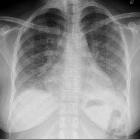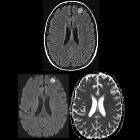AIDS defining illness
AIDS-defining illnesses are conditions that in the setting of a HIV infection confirm the diagnosis of AIDS and do not commonly occur in immunocompetent individuals . According to the CDC surveillance case definition , they are:
Infectious
- bacterial infections: multiple or recurrent
- candidiasis: of esophagus, bronchi, trachea, or lungs
- coccidioidomycosis: disseminated or extrapulmonary
- cryptococcosis: extrapulmonary
- cryptosporidiosis or isosporiasis: chronic intestinal
- cytomegalovirus disease: other than liver, spleen, or nodes
- cytomegalovirus retinitis: with loss of vision
- herpes simplex: chronic ulcers, bronchitis, pneumonitis, or esophagitis
- histoplasmosis: disseminated or extrapulmonary
- Mycobacterium tuberculosis, Mycobacterium avium complex or other species: disseminated or extrapulmonary
- Pneumocystis pneumonia
- pneumonia: recurrent
- progressive multifocal leukoencephalopathy
- Salmonella septicemia: recurrent
- cerebral toxoplasmosis
Neoplastic
- cervical cancer: invasive
- Kaposi sarcoma
- lymphoma: Burkitt, immunoblastic or primary CNS
Non-infectious / non-neoplastic
- encephalopathy: HIV related
- lymphoid interstitial pneumonia (LIP) or pulmonary lymphoid hyperplasia complex
- wasting syndrome of HIV
Siehe auch:
- Progressive multifokale Leukenzephalopathie
- Zervixkarzinom
- mycobacterium tuberculosis
- lymphozytisch interstitielle Pneumonie
- Pneumocystis jiroveci Pneumonie
- musculoskeletal manifestations of AIDS
- CNS manifestations of AIDS
- Kryptokokkose
- Kaposisarkom
- Toxoplasmose
- HIV associated neoplasms
- pulmonary manifestations of AIDS
- Zytomegalievirus
- cardiovascular manifestations of AIDS
- Pneumocystis jiroveci
- AIDS
- primary CNS
und weiter:

 Assoziationen und Differentialdiagnosen zu AIDS defining illnesses:
Assoziationen und Differentialdiagnosen zu AIDS defining illnesses:









